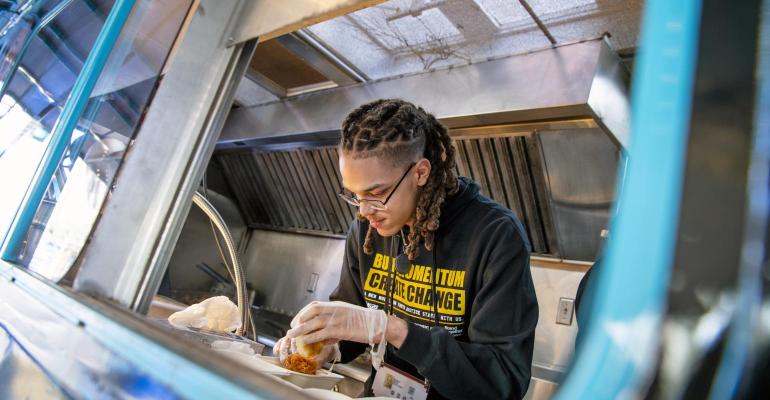Food journalist and former New York Times dining columnist Mark Bittman said in a recent interview with The Guardian that he wants to start a chain of nonprofit restaurants and has been pitching the idea — called Community Kitchen — to potential investors. Bittman has touted the (for now) menu-free concept as an idea that would prioritize promoting regenerative agriculture, paying workers fairly, and offering food on a sliding-scale price structure over profit.
While in the interview, Bittman seemed to want to change the world through this business model, and be “really disruptive, really revolutionary, really radical” to address current issues in the global food system, he is hardly the first entrepreneur to tread these waters.
Nonprofit and charitable restaurants have been giving back to communities and hungry people in need of an alternative meal solutions for years. Several operate under the “pay what you can” model like SAME Café (So All May Eat) in Denver, which hosts large-scale fundraising events and accepts donated produce from local farmers to stay open. Another similar “pay what you can” example is JBJ Soul Kitchen, with most locations in New Jersey, that is owned and operated by the Jon Bon Jovi Soul Foundation. Guests can either pay a suggested menu price or volunteer to help in the restaurant for one hour (and the restaurant being backed by a popular rock artist likely has led to its longevity).
Other nonprofit restaurants have a targeted community in mind that they are trying to help through their nonprofit operations, like Emma’s Torch in Brooklyn, which provides culinary training to refugees to help them assimilate into society, and Café Momentum, which was founded in Dallas as a nonprofit training organization and restaurant to help formerly incarcerated youths transition to a better life. Most recently, O’Charley’s launched a virtual nonprofit restaurant that benefits families of fallen soldiers.
There are also several other restaurants across the country that are for-profit, but are also civic-minded in their mission and charitable donations, like the growing concept, Hot Chicken Takeover, which employs mainly formerly incarcerated and/or homeless people, and Everytable, which has a franchising program designed to recruit tap entrepreneurs of color to operate in underserved communities.
“Restaurants with a cause” experienced an uptick in popularity during the height of the pandemic, when many for-profit restaurants began to help out in their communities by offering food and amenities to people in need in order to keep their employees on payroll and keep the lights on.
Over the years, several of these restaurants — both civic-minded for-profit restaurants and charitable eateries — have closed, mainly because the nonprofit restaurant model is not necessarily meant to last forever, like EAT (Everybody at the Table) Café, which was a project in partnership with Drexel University that ended in 2019.
But that does not mean that Mark Bittman’s dream of creating and replicating a nonprofit restaurant model is impossible: it just might be harder to maintain over a long period of time. Like any nonprofit, the hypothetical Community Kitchen would require a steady stream of income from charitable benefits or angel investors, like Alma Cocina Latina owner Irena Stein who had the idea to open her own community kitchen restaurant during the pandemic that was inspired — and financially boosted by — chef José Andrés and his World Central Kitchen.
Right now, according to his interview with The Guardian, Bittman is looking to raise $2 million to open the first Community Kitchen location and then will continue to raise $25 million to open the next five locations.
Although the project still seems to be in the “blue sky” phase, to be successful, Bittman might want to create a thesis statement that would help a specific community of people or home in on food insecurity as a systemic problem in the industrial food complex. If Community Kitchen was able to retain a group of angel investors as well as everyday donations, and launch education events they could sell tickets to, then the model might make a long-term difference in the restaurant industry. But it’s not guaranteed: restaurants are becoming increasingly difficult to run on razor-thin margins even in traditional, for-profit business models.
Contact Joanna at [email protected]m





